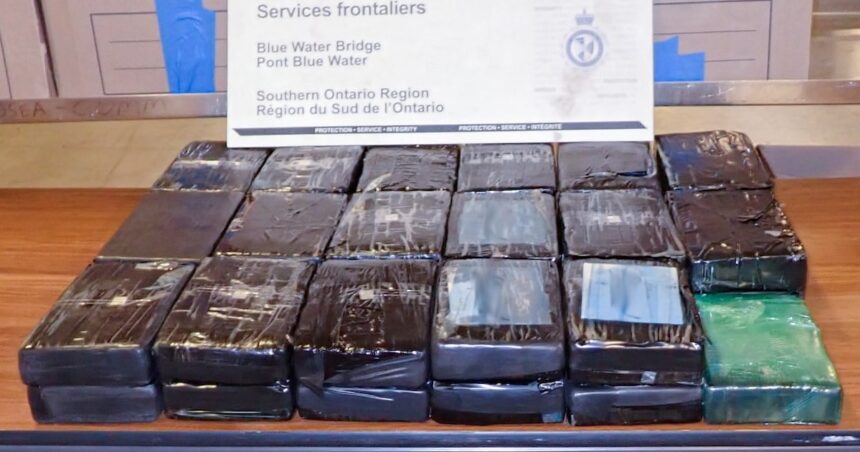Canada Border Services Agency officers at the Blue Water Bridge in Sarnia made a significant discovery on February 18, confiscating over 230 kilograms of cocaine from a commercial truck entering from the United States. The seizure, valued at approximately $23 million, led to the arrest of a Brampton, Ontario resident.
Sukhjit Tatla, 41, faces serious charges including importation of a controlled substance and possession for the purpose of trafficking under the Controlled Drugs and Substances Act. According to court documents I reviewed, these charges could result in a maximum sentence of life imprisonment if convicted.
“This seizure represents one of the largest cocaine interceptions at the Blue Water crossing in the past five years,” said RCMP Inspector Lesley Gillies in a press conference yesterday. “The volume suggests connections to organized crime networks operating across our borders.”
The investigation began when border agents noticed irregularities during a routine secondary examination of the truck’s cargo. Drug-detection dogs subsequently alerted officers to several pallets of commercial goods where the cocaine was concealed in false compartments.
The RCMP-led Border Enforcement Team, a multi-jurisdictional task force including Sarnia Police and Ontario Provincial Police, conducted the follow-up investigation leading to Tatla’s arrest in Brampton three days after the initial seizure.
Court records show Tatla appeared before a justice of the peace at the Sarnia Courthouse on February 22 and was remanded into custody pending a bail hearing scheduled for next week.
This case highlights the ongoing challenge of cross-border drug trafficking despite enhanced security measures. Statistics from the CBSA annual enforcement report indicate that officers seized more than 1,200 kilograms of cocaine at various ports of entry across Canada in 2023.
“Large-volume seizures typically indicate sophisticated smuggling operations,” explained Dr. Christian Leuprecht, a security expert at Queen’s University whom I interviewed about the case. “These networks exploit legitimate commercial shipping to move product, betting that the sheer volume of cross-border traffic makes detection difficult.”
The Blue Water Bridge, connecting Port Huron, Michigan to Sarnia, Ontario, processes approximately 1.5 million commercial vehicles annually, making it one of Canada’s busiest border crossings and a potential target for smugglers.
CBSA spokesperson Marie-Claude Frigon told me that officers employ a risk-based approach combining intelligence, technology, and physical inspections to intercept contraband. “Our officers are trained to identify suspicious patterns and behaviors that might indicate smuggling activities,” she said.
The cocaine seized in this operation would have supplied thousands of users and generated millions in profits for criminal organizations had it reached Canadian streets. According to Health Canada data, cocaine remains one of the most commonly used illicit drugs in Canada, with approximately 2.2% of Canadians reporting use in the past year.
Peel Regional Police assisted in executing the search warrant at Tatla’s Brampton residence, where investigators reportedly found additional evidence connecting him to the smuggling operation. The RCMP declined to provide specific details, citing the ongoing investigation.
“We believe this individual was not acting alone,” stated RCMP Corporal James Grandy. “Our investigation continues as we work to identify other members of this trafficking network.”
The case raises questions about the effectiveness of current border security protocols. While this seizure demonstrates successful interdiction, experts suggest many shipments likely go undetected.
“For every major seizure we see publicized, an unknown quantity of drugs successfully crosses our borders,” noted Dr. Leuprecht. “The economics of drug trafficking account for these losses – they’re built into the business model.”
Tatla’s lawyer, Margaret Williams, declined to comment when contacted except to say her client would be pleading not guilty to all charges.
The CBSA and RCMP have increased cooperation in recent years through integrated border enforcement teams designed to combat transnational organized crime. This case represents the kind of result such collaboration aims to achieve.
As this investigation continues, authorities urge anyone with information about drug trafficking operations to contact the RCMP or submit anonymous tips through Crime Stoppers. The next court date in this case is scheduled for March 8 at the Sarnia Courthouse.






